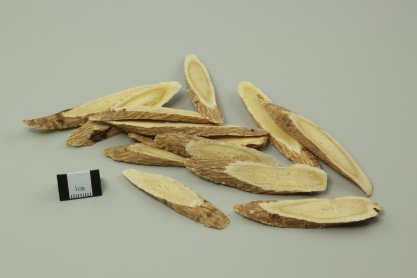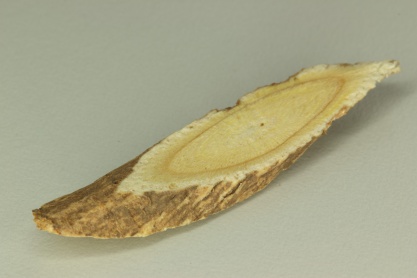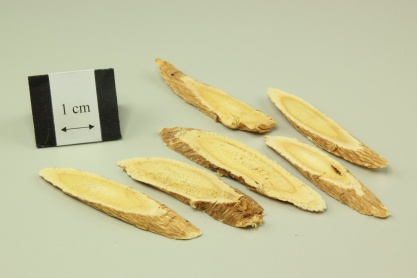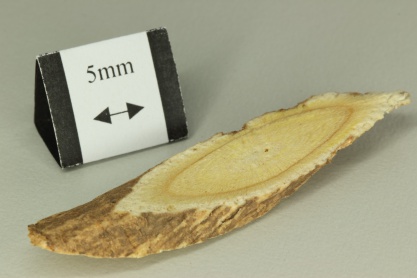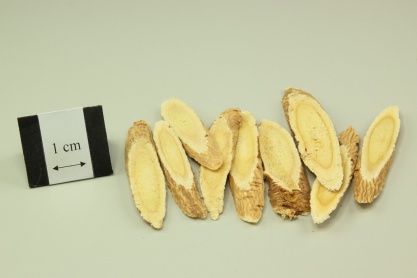- ENG
- Milkvetch Root
- LATIN
- Astragali Radix
| Medicinal Group | Qi-tonifying medicinal |
|---|---|
| Source | Dried root of Astragalus membranaceus (Fisch.) Bge. var. mongholicus (Bge.) Hsiao or Astragalus membranaceus (Fisch.) Bge. (Fam. Leguminosae) |
| Nature and Flavors | sweet; warm |
| Meridian Affinity | Spleen, Lung |
| Actions | To tonify qi and strengthen the superficial resistance, induce diuresis and promote drainage of pus and growth of new tissue |
Family
Part used
Indications
Deficiency of qi with lack of strength, anorexia and loose stools, sinking of spleen-qi manifested by chronic diarrhea, prolapse of the rectum, hemafacia and abnormal uterine bleeding; spontaneous sweating due to deficiency of qi; abscesses difficult to burst or heal; albuminuria in chronic nephritis; diabetes
- Milkvetch root can improve the immune function of patients with acute exacerbation of chronic obstructive pulmonary disease. [1]
- Lixu Jieyu Recipe (consisted of milkvetch root) shows superiority in treating chronic fatigue syndrome[2]
- Integrative Western and Chinese medicine (consisted of milkvetch root) could adjust immune function to display a quick, potent anti-inflammatory and anti-anaphylactic actions in treating chronic urticaria with less adverse reaction and low recurrent rate.[3]
- Yiqi Yangyin Jiedu Decoction (consisting of milkvetch root) can ameliorate the qi-yin deficiency syndrome evidently in advance lung cancer patients. [4]
- TYK decoction (consisted of milkvetch root) could improve the function of islet beta-cell in patients with latent autoimmune diabetes mellitus in adults. [5]
- Huanglan Granule (containing milkvetch root) has obvious inhibitory effect on rubella virus, both in vitro and in vivo, it can also raise the immunity of organism. [6]
- Calycosin (the major bioactive chemical in the dry root extract of Radix astragali) exhibits promising effects for the treatment of tumors, inflammation, stroke, and cardiovascular diseases. [7]
- Therapy with radix astragali or its compound prescription is effective and safe in children with β-thalassemia.[8]
- Using a drug pair of Radix Astragali and Rehmanniae Radix combined with glucocorticoid in treating lupus nephritis could withdraw the dosage of glucocorticoid and relieve symptoms it induced.[9]
- Myelophil, an extract of a mix of Astragali Radix and Salviae Radix, appears to have a pharmacological effect against fatigue. [10]
- The polysaccharides, saponins, and flavonoids of Radix astragali, and the whole extract of Radix astragali have been widely reported with their anticancer effects in preclinical studies and showed a potential application as a adjunctive cancer therapeutics with the activities of immunomodulation, anti-proliferation and attenuation of adverse effects induced by cytotoxic therapy.[11]
- Extract of Astragali Radix induces a marked natriuresis in healthy men. [12]
- Radix Astragali could significantly relieve the clinical symptoms such as hidrosis and palpitation, regulate the immune function of Graves disease patients, playing an important role in the adjuvant therapy for Graves disease. [13]
- The average recovery of hearing and cessation of tinnitus was significantly better after treatment with Radix Astragali (RA) than after non-treatment with RA.[14]
- Appetite and body weight in patients with anorexia in advanced cancer were improved with the herbal decoction with Astragali radix. [15]
- Radix Astragli Injection can enhance the inhibitory function of corticosteroid/immunosuppressant on apoptosis, and regulate the ratio and function of T lymphocyte subsets to normal range. [16]
- Astragali compound (AC), containing Radix Astragali and adjuvant components, may promote recovery from viral hepatitis and inhibit HBV replication.[17]
Cautions
Interacts with Cyclophosphamide; Lithium; Immunosuppressants
Report on adverse effect
Digestive reactions, allergic reactions [18]
May not be appropriate for the treatment of autoimmune disease or following organ transplantation. Allergic symptoms may occure due to histamine release [19]
Reference
Reference
- Jiang D, Wang X, Su Q, Jiang S, Yuan F, Zhang C, Gong F, Dong Q, Shi J, Chen B. (2015). Milkvetch root improves immune function in patients with acute exacerbation of COPD. Biomed Mater Eng. , 26 Suppl 1:S2113-21. doi: 10.3233/BME-151517.
- Jiang D, Wang X, Su Q, Jiang S, Yuan F, Zhang C, Gong F, Dong Q, Shi J, Chen B. (2015). Milkvetch root improves immune function in patients with acute exacerbation of COPD. Biomed Mater Eng. , 26 Suppl 1:S2113-21. doi: 10.3233/BME-151517.
- Jin CY, Wang DL, Fang ZD. (2008 ). Effect of integrative Chinese and Western medicine in treating chronic urticaria and its impact on interleukin-10 and interleukin-8 in peripheral blood. Zhongguo Zhong Xi Yi Jie He Za Zhi. , 28(4):358-60.
- Liu LS, Liu JX, Li CJ. (2008). Clinical effect of yiqi yangyin jiedu decoction in treating patients with advanced non-small cell lung cancer]. Zhongguo Zhong Xi Yi Jie He Za Zhi. , 28(4):352-5.
- Xu XW, Zhang DX. (2008). Effect of Tangyikang in improving the function of pancreatic islet beta cells in patients with latent autoimmune diabetes mellitus in adults. Zhongguo Zhong Xi Yi Jie He Za Zhi. , 28(10):882-5.
- He Y, Hao XP, Yang D. (2008). Clinical and experimental study on effects of huanglan granule in inhibiting rubella virus]. Zhongguo Zhong Xi Yi Jie He Za Zhi. , 28(4):322-5.
- Gao J, Liu ZJ, Chen T, Zhao D. (2014 ). Pharmaceutical properties of calycosin, the major bioactive isoflavonoid in the dry root extract of Radix astragali. Pharm Biol. , 52(9):1217-22. doi: 10.3109/13880209.2013.879188. Epub 2014 Mar 17.
- Lu ZM, Qian XH, Chen ZW, Zhang CH, Guo LS, Chen J. (2012). Prospective clinical study of radix astragali and its compound prescription for treatment of β-thalassemia in children. Zhongguo Dang Dai Er Ke Za Zhi. , 14(5):344-9.
- Li M, Ma JJ, Zhao XL, Zhu Y. (2014). Treating lupus nephritis by a drug pair of radix astragali and rehmanniae radix combined with glucocorticoid: a preliminary clinical study. Zhongguo Zhong Xi Yi Jie He Za Zhi. , 34(8):956-9.
- Cho JH, Cho CK, Shin JW, Son JY, Kang W, Son CG. ( 2009). Myelophil, an extract mix of Astragali Radix and Salviae Radix, ameliorates chronic fatigue: a randomised, double-blind, controlled pilot study. Complement Ther Med. , 17(3):141-6. doi: 10.1016/j.ctim.2008.11.003. Epub 2009 Jan 23.
- Jung Y, Jerng U, Lee S. (2016). A systematic review of anticancer effects of radix astragali. Chin J Integr Med. , 22(3):225-36. doi: 10.1007/s11655-015-2324-x. Epub 2015 Dec 7.
- Ai P, Yong G, Dingkun G, Qiuyu Z, Kaiyuan Z, Shanyan L. (2008). Aqueous extract of Astragali Radix induces human natriuresis through enhancement of renal response to atrial natriuretic peptide. J Ethnopharmacol. , 116(3):413-21. doi: 10.1016/j.jep.2007.12.005. Epub 2007 Dec 23.
- Wu J, Liu DF, Chen Y. (2011). Effects of Radix Astragali on IL-1beta, TNF-alpha and antigen expression of peripheral blood mononuclear cells in patients with Graves disease. Zhongguo Zhong Xi Yi Jie He Za Zhi. , 31(11):1487-90.
- Xiong M, He Q, Lai H, Huang W, Wang L, Yang C, Wang J. (2011). Radix Astragali injection enhances recovery from acute acoustic trauma. Acta Otolaryngol. , 131(10):1069-73. doi: 10.3109/00016489.2011.591823. Epub 2011 Jun 1.
- Lee JJ, Lee JJ. (2010). A phase II study of an herbal decoction that includes Astragali radix for cancer-associated anorexia in patients with advanced cancer. Integr Cancer Ther. , 9(1):24-31. doi: 10.1177/1534735409359180. Epub 2010 Feb 11.
- Cai XY, Xu YL, Lin XJ. (2006). Effects of radix Astragali injection on apoptosis of lymphocytes and immune function in patients with systemic lupus erythematosus. Zhongguo Zhong Xi Yi Jie He Za Zhi. , 26(5):443-5.
- Tang LL, Sheng JF, Xu CH, Liu KZ. (2009). Clinical and experimental effectiveness of Astragali compound in the treatment of chronic viral hepatitis B. J Int Med Res. , 37(3):662-7.
- 熊紅麗 (2002)。<黃芪的臨床應用進展及其不良反應>。藥學服務與研究,3。
- Wadington, C., Roy, U., & American Herbal Pharmacopoeia,. (1999). Astragalus root : Astragalus membranaceus & Astragalus membranaceus var. mongholicus : analytical, quality control, and therapeutic monograph (pp. 20-21). Santa Cruz, Calif.: American Herba


